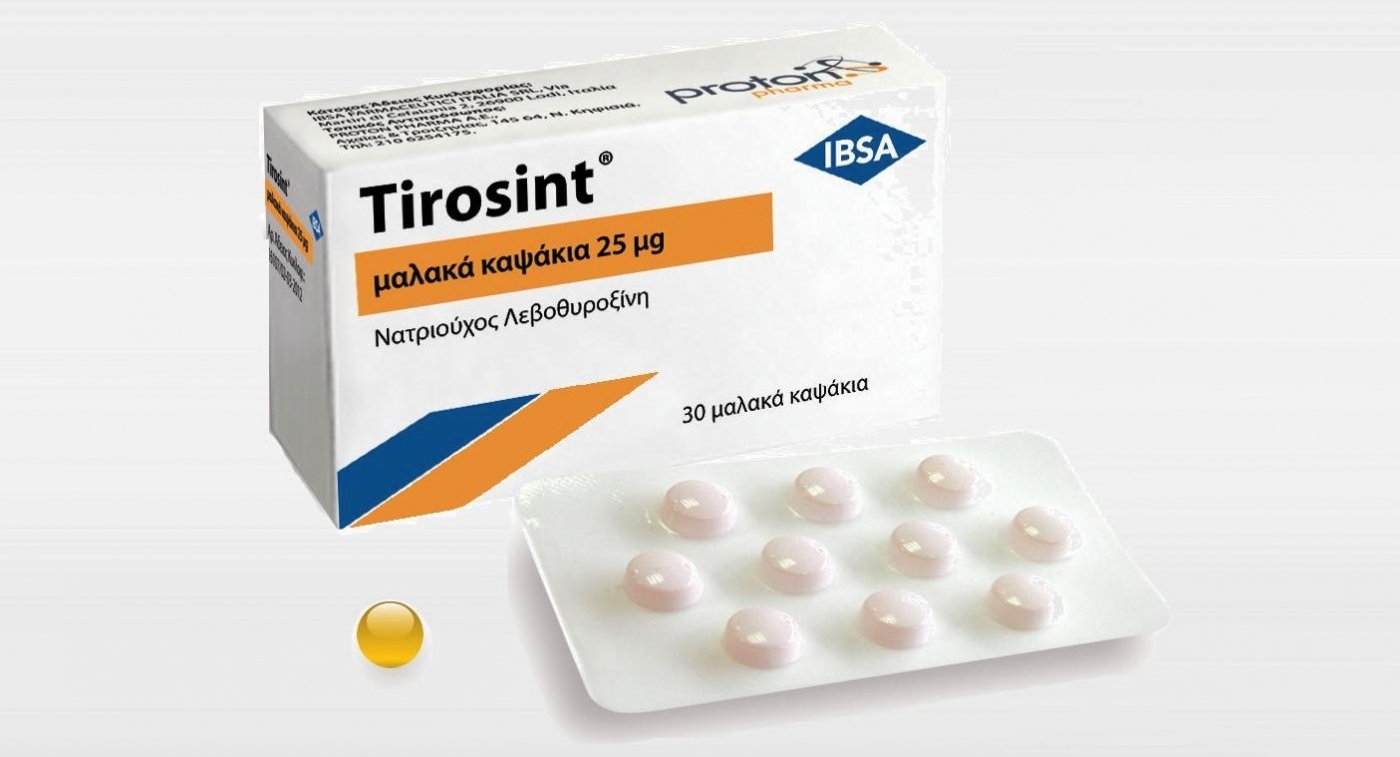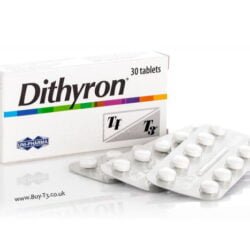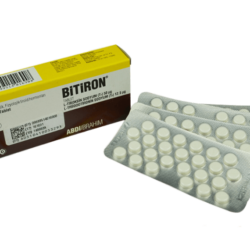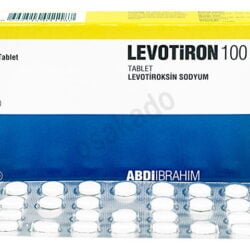Description
Description
What Tirosint is and what it is used for
Tirosint contains the synthetically manufactured levothyroxine, which is completely identical to the hormone naturally produced by the thyroid gland.
Tirosint is mainly used in the following cases:
To supplement the missing hormone in various forms of hypothyroidism.
If you have an overactive thyroid, Tirosint can be taken with an antithyroid agent to help stabilize your metabolism.
To suppress renewed tumor growth and to supplement missing thyroid hormones, especially after surgical removal of malignant tumors (malignancy) of the thyroid gland.
To test thyroid function.
To prevent goiter from coming back after goiter surgery or to treat benign goiter.
To eliminate the signs of illness that often occur with an underactive thyroid gland, such as lack of drive, loss of performance, tiredness, sensitivity to cold, changes in skin and hair or constipation.
Successful treatment requires regular intake of the drug.
Prescriptened by your doctor.
When should Tirosint not be taken?
Tirosint must not be used:
For overactive thyroid. Exception: as an adjunctive therapy when taking a drug to inhibit hyperthyroidism (after normal metabolic status has been reached).
In case of known hypersensitivity to the active substance or to any excipient of Tirosint.
In the presence of a recent myocardial infarction, severe angina pectoris, cardiac insufficiency with increased heart rate and untreated functional disorders of the adrenal cortex.
There is no evidence that thyroid hormones have a weight-reducing effect in overweight patients or in patients with normal thyroid function. For this reason, and because higher doses can cause very serious side effects, Tirosint is not suitable for treating obesity and must not be used.
When is caution required when using Tirosint?
Be sure to tell your doctor if you have heart disease, diabetes or high blood pressure so that your doctor can adjust the treatment accordingly.
If the pituitary gland is underactive or if the adrenal glands are not working properly for other reasons, your doctor will probably prescribe an additional treatment with adrenal cortex hormones.
The following medicines can change the way levothyroxine works
Lipid-lowering drugs such as cholestyramine and colestipol: if cholestyramine or colestipol is taken at the same time to treat high cholesterol levels (lipid-lowering drugs), the absorption of thyroid hormones from the intestine into the blood is reduced. Therefore, Tirosint should be taken 4-5 hours before the cholestyramine or colestipol dose.
Iron preparations or products containing aluminum and other medicines for stomach acid and heartburn (so-called antacids or sucralfate) can inhibit the absorption of tirosint from the intestine. They should be taken at least 2 hours after Tirosint.
Concomitant use of contraceptives (“the pill”) can increase the need for Tirosint. If you are taking a contraceptive for the first time or if you are changing methods, tell your doctor. The dosage of Tirosint may need to be adjusted.
Medicines to treat seizures (carbamazepine, phenytoin, phenobarbital) and the antibiotic rifampicin can shorten or weaken the effect of Tirosint.
Medicines such as amiodarone for heart rhythm problems or beta-blockers may increase the duration of action of Tirosint.
Lithium preparations used to treat mental illness and medicines containing iodine inhibit the secretion of thyroid hormones from the thyroid gland. When taken concomitantly with Tirosint, the effect on treatment with Tirosint must be carefully monitored.
The following medicines can affect the way levothyroxine works
Ritonavir: used to control HIV and treat chronic hepatitis C.
Levothyroxine can change the way the following medicines work
Blood sugar-lowering medicines (antidiabetics): Tirosint can reduce the blood-sugar-lowering effect of these medicines. The blood sugar level must therefore be checked regularly in diabetes mellitus, especially at the start of Tirosint treatment. If you change the dose of Tirosint, tell your doctor so that the dose of the blood-sugar-lowering medicine can be adjusted accordingly.
Medicines to reduce blood clotting: if you are taking such medicines, regular blood clotting tests are required at the start of Tirosint treatment. If necessary, your doctor will prescribe a dose reduction of the anticoagulant drug, since Tirosint increases the effect of anticoagulants.
If you are taking medicines that improve the performance of the heart muscle (cardiac glycosides) at the same time, Tirosint can increase their effect. Therefore, with such combinations, the dose of the cardiac drug must be re-examined.
Tirosint can accelerate the onset of action of antidepressants (tricyclic antidepressants) and enhance the effect of circulatory stimulants.
Tell your doctor or pharmacist if you are on
suffering from other diseases
have allergies or
take other medicines (including those you bought yourself)!
This medicinal product contains less than 1 mmol sodium (23 mg) per capsule, ie essentially ‘sodium-free’.
Can Tirosint be used during pregnancy or while breastfeeding?
The use of Tirosint should not be interrupted during pregnancy and lactation. However, your doctor will decide whether and in what dosage you can take Tirosint during pregnancy or breastfeeding.
How do you use Tirosint?
The required daily dose varies from person to person and is determined by the doctor on the basis of laboratory diagnostics and clinical examinations. In order to optimally enable this individual treatment, capsules are available in different dosages with graded contents of 13 to 200 µg of the active ingredient.
The starting dose for adults is usually 25-50 µg daily and is increased every 2-4 weeks by 13-50 µg/day up to 100-200 µg/day until metabolism is normal.
Your doctor should check the function of your thyroid gland regularly and when switching from another levothyroxine preparation.
The starting dose is lower in elderly patients, patients with heart disease, severe hypothyroidism, or other metabolic disorders.
In children, the dose is determined according to body weight. Depending on the disease, the dose can also be higher.
Tirosint is not suitable for infants under the age of 1 year.
Strictly adhere to the dose prescribed by the doctor.
Successful treatment requires regular intake of the preparation and an optimal daily dose tailored to the individual needs of the patient. If symptoms persist despite several weeks of therapy, you should see your doctor, who will decide whether to increase the dose if necessary.
If treatment is interrupted or terminated prematurely, symptoms of the disease may reappear, the nature of which depends on the underlying disease.
If you accidentally forget to take a dose of Tirosint one day, just take your normal dose the following day.
Correct way of taking
The entire daily dose is taken in the morning on an empty stomach, at least ½ hour before breakfast, with a little liquid.
duration of treatment
Treatment with Tirosint is given for life in the case of hypothyroidism and thyroid surgery due to a malignant tumor of the thyroid gland, and for a few months or years to life in the case of benign goiter and to prevent the goiter from growing again.
In the case of concomitant therapy for the treatment of hyperthyroidism, treatment with Tirosint is carried out in accordance with the duration of treatment with an inhibitory drug.
Thyroid function test: Take for 14-28 days until the scintigram is performed.
Do not change the prescribed dosage on your own. If you think the medicine is too weak or too strong, talk to your doctor or pharmacist.
What side effects can Tirosint have?
The following symptoms may occasionally occur as a result of the metabolism-increasing effect of Tirosint, especially if the dose is too high or if the dose is increased too quickly at the beginning of treatment:
Restlessness, excessive, rapid heartbeat (tachycardia), irregular heartbeat, chest pain (angina pectoris), increased sweating, diarrhea, weight loss, tremors, headache, insomnia.
In these cases, you should consult your doctor. Your therapy may be changed.
If you notice side effects that are not described here, you should inform your doctor or pharmacist.
What should also be noted?
Tirosint should be stored in the original packaging, at room temperature (15-25°C) and protected from light.
Keep medicines out of the reach of children.
The medicinal product may only be used up to the date marked “Exp” on the container.
Your doctor or pharmacist can provide you with further information. These people have the detailed information for specialists.
What does Tirosint contain?
1 capsule Tirosint 13 µg contains 13 µg levothyroxine sodium as an active ingredient.
1 capsule Tirosint 25 µg contains 25 µg levothyroxine sodium as an active ingredient.
1 capsule Tirosint 50 µg contains 50 µg levothyroxine sodium as an active ingredient.
1 capsule Tirosint 75 µg contains 75 µg levothyroxine sodium as an active ingredient.
1 capsule Tirosint 88 µg contains 88 µg levothyroxine sodium as an active ingredient.
1 capsule Tirosint 100 µg contains 100 µg levothyroxine sodium as an active ingredient.
1 capsule Tirosint 112 µg contains 112 µg levothyroxine sodium as an active ingredient.
1 capsule Tirosint 125 µg contains 125 µg levothyroxine sodium as an active ingredient.
1 capsule Tirosint 137 µg contains 137 µg levothyroxine sodium as an active ingredient.
1 Tirosint 150 µg capsule contains 150 µg levothyroxine sodium as an active ingredient.
1 capsule Tirosint 175 µg contains 175 µg levothyroxine sodium as an active ingredient.
1 capsule Tirosint 200 µg contains 200 µg levothyroxine sodium as an active ingredient.
Excipients:
Gelatin, glycerol (E422), water.
registration number
Marketing Authorization Holder
IBSA Institut Biochimique SA, Lugano.






Reviews
There are no reviews yet.